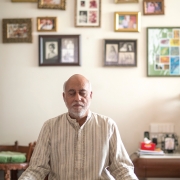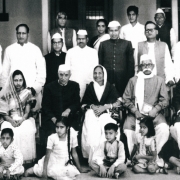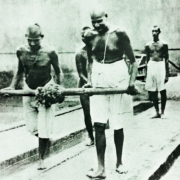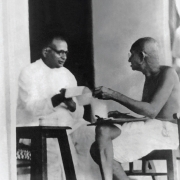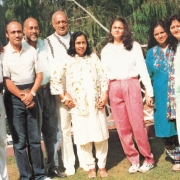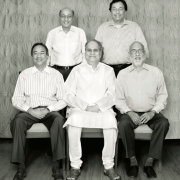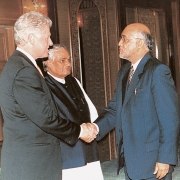
People
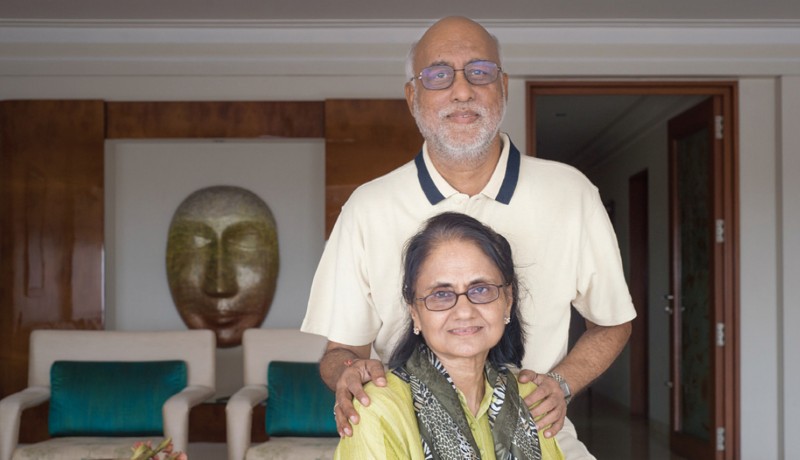
Shekhar Bajaj, CMD of Bajaj Electricals Ltd, leads a life worth emulating: simple living, and straight thinking. Sai Prabha Kamath meets the scion of the distinguished Bajaj family for whom the nation always comes first
It’s a tall order to live up to a name with an illustrious history. Bajaj—a brand to reckon with in the industrial circuit—is also a name synonymous with India’s freedom movement. A rich cotton merchant from Wardha in Maharashtra, Jamnalal Bajaj played an important role in the freedom struggle in the early 1900s. His sheer earnestness, commitment and ability to transform thoughts into deeds made him a close associate of Mahatma Gandhi. In 1926, when India’s struggle for independence was at its peak, Jamnalal Bajaj founded the Bajaj group on the basis of integrity and resourcefulness. Today, his grandson Shekhar Bajaj is carrying forward the torch in his own way as chairman and managing director of Bajaj Electricals Ltd (BEL).
With strong ethics and the belief that people are the ultimate source of strength, the ₹ 42-billion BEL strives to be socially responsible and environmentally sustainable in its appliances, engineering and rural electrification services. “It is indeed a privilege to be part of a family with this kind of a lineage,” says the 67 year-old Bajaj. “Equally, it makes me feel responsible to keep up the family name.”
Simplicity is the hallmark of the clan, who are strong believers of Gandhi’s ideals. And this resonates in Bajaj’s elegant sea-facing apartment in the upscale Cuffe Parade area in South Mumbai. As Team Harmony arrives before the appointed time, the polite and soft-spoken Bajaj ushers us in cordially. A little later, he is joined by wife Kiran, an environmentalist, poet and cultural activist. “Today, it is painful to see westernised culture,” she says. “The Bajajs have always propagated Hindi; in fact, we print our company balance sheet in Hindi too, which few companies do. Our family mantra is, ‘Give your best and make the country proud.” The couple is expecting its first grandchild soon and the doting mother-in-law is just back with her daughter-in-law from a doctor’s visit. The gracious hosts keep the food and beverages flowing through the interview. Excerpts:
Born and raised in a large, affluent family, your childhood must have been quite interesting….
My grandfather Jamnalalji, who was an adopted grandson of a rich Rajasthani cotton merchant Seth Bachchraj Bajaj, settled in Wardha, had three daughters and two sons, my uncle Kamalnayan and my father Ramkrishna. I was brought up in Mumbai in a joint family where my uncle’s two sons Rahul and Shishir, daughter Suman, and my brothers Madhur, Niraj and I had a very happy childhood. For us, it was always five brothers and a sister; there was no differentiation between us. As our mothers were also real sisters, we cousins had the same maternal uncles and grandparents. My mother and aunt had been brought up in a luxurious Western atmosphere. Every winter, we would go to our Nana’s place in Calcutta. All Bajajs are great foodies! Though we lived simply, when it came to food, we ate Chinese, Italian, Continental cuisines, which was rare in 1950s Marwari homes.
That’s fascinating! What were the values you imbibed during your growing years?
My father was of the opinion that children, on reaching a certain age, should be sent to boarding school. This, he felt, would equip them to face situations independently. At the age of 11, I was sent to Doon School in Dehradun. In fact, my parents did not come to drop me; I was seen off with the school party. This was my initiation into being tough and managing difficult situations. As Jamnalalji’s whole family had taken to wear homespun cotton cloth [since the freedom movement], even I used to wear my school uniform made in khadi—with special permission from the school authorities. Also, I was able to abstain from smoking, drinking and non-vegetarian food through my life because of the strong values I imbibed.
Jamnalalji was a social reformer and a close confidant of Mahatma Gandhi. In fact, it is believed Gandhi adopted him as his son….
Dadaji had a streak of spirituality and patriotism from his early age. Renunciation came easily to him. He always believed in making words into deeds. The prevalence of untouchability pained him so much that in 1928, he opened the doors of the family-owned Laxminarayan Temple in Wardha to ‘Harijans’. When he was in pursuit of a mentor and guide, he found Gandhi nearest to his ideals, and accepted him as his mentor. Gandhi transformed the whole pattern of his and his family’s life; our family gave up luxuries such as wearing jewellery and foreign garments, and began to spin and wear khadi. He also succeeded in persuading Gandhi to make Wardha his home, offering land for establishing Gandhi’s home—Sevagram— and other national activities. He took to extremely austere living and devised and practised a strict code of ethics in business, giving his all to Gandhi’s Constructive Programme. Gandhi referred to my grandfather as ‘Merchant Prince’ and adopted him as his ‘fifth son’. In Gandhi’s own words, ‘Jamnalalji surrendered himself and his all, without reservation.’
What was the common vision they shared?
It was ‘self-reliance through constructive work’. Dadaji totally subscribed to Gandhi’s considered vision that his Constructive Programme would be the bedrock of governance in free India. The Constructive Programme, in its most liberal perspective, included Swaraj, class equality, gender equality and ethics in all areas of activity, eradication of untouchability, communal harmony, women’s empowerment, propagation of khadi and Hindi, trusteeship in business, go seva—cattle wealth being the backbone of rural India, and Swadeshi as the key to India’s all-round development. All this was to be achieved through Satyagraha and non-violence.
Tell us about his active participation in the freedom struggle.
Dadaji renounced the titles of ‘Honorary Magistrate’ and ‘Rai Bahadur’ that the British had bestowed on him. He participated in the Non-Cooperation Movement [1921], the Nagpur Jhanda Satyagraha [1923] to uphold the honour of our national flag, the boycott of the Simon Commission [1929], the Salt Satyagraha [1930] and the Anti-War Campaign [1941]. On several occasions, he suffered confiscation of assets, physical attacks and protracted jail terms, preferring a ‘C’ class prisoner status. In 1920, Dadaji offered Bajajwadi, his home in Wardha, to the freedom movement. Soon, this became the hub of political activity with many national leaders enjoying his generous hospitality.
Though Jamnalalji passed away before your birth, what kind of mark did he leave on you?
Though I did not have the pleasure of physically interacting with Dadaji, I always felt his presence strongly through the reminiscences of my grandmother Jankideviji, uncle, father and aunts [father’s sisters]. Dadaji was not just a nationalist; he also believed in and practised simple living. He never ever compromised on his high ethical standards. As for his life of simplicity, late political leader Dr Ram Manohar Lohia once said, ‘He lowered his standard of living to that of the lower middle class.’ This inspired me in many ways and I could imbibe some of his values in small measures.
Your grandmother Jankideviji too followed in Jamnalalji’s footsteps and identified herself with the Gandhian movement such as spinning khadi on the charkha and anti-untouchability. During the freedom struggle, she participated in the Civil Disobedience Movement and was imprisoned. She also worked towards women’s empowerment and the development of weaker sections of society. What are your childhood memories of her?
I was fortunate enough to spend a lot of time with Dadiji; during her Mumbai trips, she used to stay with us. We would also visit Wardha, where she lived, frequently. After I got married, Kiran would also join me in spending a lot of time with her. Dadiji was brought up in a strict, traditional Vaishnav family. But after marriage, she followed Jamnalalji’s Gandhian ideals to the hilt. She renounced purdah, ornaments and, above all, was against Dalit discrimination. When Dadaji passed away in 1942, she wanted to perform sati on his pyre. But Gandhi prevailed upon her and convinced her, saying, ‘Rather than burning yourselves, burn your vices on the pyre; that is being a true sati. Dedicate yourself and your all to the unfinished work of Jamnalal.’ Hence, until her death in 1979, she kept working for various social causes that Dadaji was very passionate about: khadi, Swadeshi and anti-cow slaughter. In recognition of her services and sacrifices, she was honoured with the Padma Vibhushan by President of India, Dr Rajendra Prasad, in 1956. In 1993—her birth centenary year—under the presidentship of my wife, the IMC Ladies Wing Jankidevi Bajaj Puraskar was instituted for women entrepreneurs working for the progress of rural India. What impressed me most about Dadiji was her determination and perseverance. From her, my wife and I learnt how to live simply without wasting anything. But this way of life has also earned all of us the sobriquet ‘kanjoos’!
What were the life lessons you learnt from your father Ramkrishnaji?
For my father, good ethics was good business; hence, the image of any business could be built and furthered only through good ethical standards. In 1966, when India was undergoing a chronic food shortage, he, along with J R D Tata, Soli Godrej, Arvind Mafatlal, etc, decided to establish the Council for Fair Business Practices [CFBP], formerly known as Fair Trade Practices Association [FTPA]. It was, and is still, the only organisation conducted by businessmen to protect the interest of the consumer. Initially, people mocked the idea of a business house taking care of the welfare of its consumers. Slowly but steadily, the members of the trade, business and industrial community started subscribing to the precepts of the CFBP as a proper way to conduct business. My father was far ahead of his time. He believed that a person needs to evaluate his own strengths and weaknesses. In this, he did not spare himself. He realised that he did not have much flair for business as he was more inclined towards philanthropic activities. As a result, in spite of being the head of the group, after Kamalnayanji’s death in 1972, he suggested that Rahul Bajaj become chairman of Bajaj Auto Ltd and he would continue as a director. He had great focus and was exceptional in detailed planning of any activity. Unfortunately, I could imbibe only a few of his traits and qualities.
Respecting one’s elders is evidently an integral part of your family value system. How were these values instilled in the younger generation of the family?
For our generation, respecting elders was a way of life. I do not remember an occasion when I would rebel or do something against my father’s wishes even if I disagreed with him. The younger generation does not feel the same way. They say, ‘Yes, as parents we respect you, but we will do what we think is right’. Perhaps, that is the demand of the times. Nevertheless, the younger generation has imbibed important family values such as integrity and trust and do follow them.
What are the challenges and perks of running a family-run business empire?
As the name Bajaj is associated with a certain background of sacrifices and values, there is instant recognition and acceptance. Along with respect, people do have a lot of expectations that we need to live up to. So, we work much harder to continue the family tradition.
Please tell us more about your family.
Kiran is a perfectionist who has managed both business and children with competence and care. She gave up a successful career of 26 years as the CEO of the Bajaj Group Travel Agency to take up social work. Today, she is actively engaged in running the NGOs Paryavaran Mitra, which works on socio-environmental issues, and Shabdam, which works towards the preservation of Indian arts, culture and literature. My son Anant [38] is involved with Bajaj Electricals for the past 19 years. He possesses good business acumen and, as joint managing director, takes care of the day-to-day functions of the company. My daughter Geetika [33] is sensitive and creative. She has already had three art shows, including one in Jehangir Art Gallery. My daughter-in-law Pooja is an affectionate, happy and well-organised person. She has been a steady anchor providing relentless support to the group by establishing a continuous connect with management college students on 3600 learning education.
How eager are you to be a grandparent?
I feel I should have become a grandparent straightaway without doing the parenting part! Enjoying with a grandchild is so much fun. Bringing up your child is much tougher.
Elder abuse is rampant around the world today. How can the elderly command respect from the younger generation?
I have seen many parents giving away wealth to their children and grandchildren and finding themselves dependent in their later years. This should be avoided by saving and building a corpus for use during the sunset years.
How do you view ageing?
Ageing, statistically, is not under your control. What matters is your mental makeup and physical fitness. I still enjoy music or a silly comedy from a movie, just the way I enjoyed it 30-40 years ago. My wife would ask, ‘When will you grow up?’ And I would say, ‘Never’.
What are the plans for your sunset years?
I like to read but most of the time, except for business and news-related books, I do not get the time to read the books I would like to. Maybe in my later years, I would like to read more and travel to interesting places.
What are your stress-busters?
Yoga, walking and meeting interesting people.
Are you spiritual by nature?
I believe in the existence of God, but do not necessarily follow rituals on a daily basis.
Any regrets?
The only area where I have not succeeded much is diet control. I have to work a lot on this; my diabetes needs to be under control.
Finally, what is your vision for India?
India has a fascinating history and rich cultural heritage no other country can boast of. In fact, the country can become the No. 1 destination for business and tourism. But corruption at high, middle and low levels is a big stumbling block. While we have a prime minister with a strong will to deliver the type of growth envisaged, only the collective political will can accomplish this. Eradication of corruption will lead to seamless civic life, acceleration of economic wellbeing of citizens, and happiness all around. I am a great believer in Indian democracy, and a positive future for India.
Photos Fawzan Husain Archival images courtesy: Shekhar Bajaj Featured in Harmony — Celebrate Age Magazine August 2015
you may also like to read
-
For the love of Sanskrit
During her 60s, if you had told Sushila A that she would be securing a doctorate in Sanskrit in the….
-
Style sensation
Meet Instagram star Moon Lin Cocking a snook at ageism, this nonagenarian Taiwanese woman is slaying street fashion like….
-
Beauty and her beast
Meet Instagram star Linda Rodin Most beauty and style influencers on Instagram hope to launch their beauty line someday…..
-
Cooking up a storm!
Meet Instagram star Shanthi Ramachandran In today’s web-fuelled world, you can now get recipes for your favourite dishes at….



